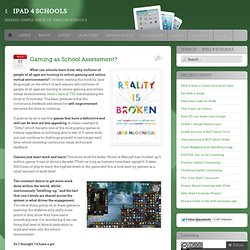

A Must-Have Guide To Gaming In The Classroom. Minecraft In Education: Pros And Cons 7.82K Views 0 Likes In an effort to weigh the benefits of Minecraft in education, I turned to the proverbial crowd on Reddit to see what they had to say about the popular game. 10 Ways To Become A Better Online Learner 7.74K Views 0 Likes There are some quick and easy ways to become a better online learner. The 11 Best Online Colleges By Category 2.77K Views 0 Likes What are the best online colleges for each discipline? The 60-Second Guide To Online vs Classroom Learning 3.53K Views 0 Likes. Oppimispeli.fi - Etusivu. Pelillisyyttä ja osallistavaa opetusta virtuaaliopetuksen päivillä - Sisäheitto. Gaming as School Assessment? What can schools learn from why millions of people of all ages are turning to online gaming and online virtual environments?

I’ve been reading this book by Jane Mcgonigal on the effect of and reasons why millions of people of all ages are turning to online gaming and online virtual environments. Here’s Jane at TED summarizing the book in 15 minutes. The basic premise is that the continuous feedback and desire for self-improvement becomes the drive to continue. It goes as far as to say that games that have a definitive end and can be won are less appealing. A classic example is “Tetris” which became one of the most popular games in history regardless of not being able to win it! Gamers just want work and learn! The constant desire to get more work done within the world, whilst continuously “levelling-up,” and the fact that one’s levels are shared across the system is what drives the engagement.
So I thought I’d have a go! Step 1 (Objectives) These might be things like: Step 2 (Technical) A Must-Have Guide To Gaming In The Classroom. A Must-Have Guide To Gaming In The Classroom. 5 Reasons to “Gamify” Your Class. 19 Pioneers Responsible For Video Games In The Classroom. While new technologies have made games an ever more prevalent and talked-about part of everyday life, the creation, development, and study of these forms of games, especially in learning, is really nothing new. Some of the best and brightest minds in engineering, education, sociology, and computer science have been analyzing how to build, improve, and understand games for several decades. Their research has helped to yield games that are more effective (not to mention fun) than ever and that reflect our changing relationship with technology.
If you’re interested in delving into some of the scholarship that continues to shape gaming today, these gaming scholars’ work is an excellent place to start. Here are 19 gaming greats (in no particular order) whose research has been critical in building and understanding games. Bill Gates: Why 'game-based learning' is the future of education. The Gates Foundation is working with the Center for Game Science at the University of Washington on a free, online game called Refraction. In Bill Gates’ vision of the classrooms of the future, students are grouped according to skill set. One cluster huddles around a computer terminal, playing an educational game or working on a simulator. Another works with a human teacher getting direct instruction, while another gets a digital lesson delivered from their teacher’s avatar. This kind of “game-based” learning is one of the priorities of the Bill & Melinda Gates Foundation, a nonprofit founded by the Microsoft creator.
Last year, the foundation announced it would invest $20 million in a variety of teacher tools, including this and other technologies geared toward changing the way teachers teach and kids learn. Gates sat down with The Atlanta Journal-Constitution last week while he was in Atlanta speaking at the Education Commission of the States’ national forum.